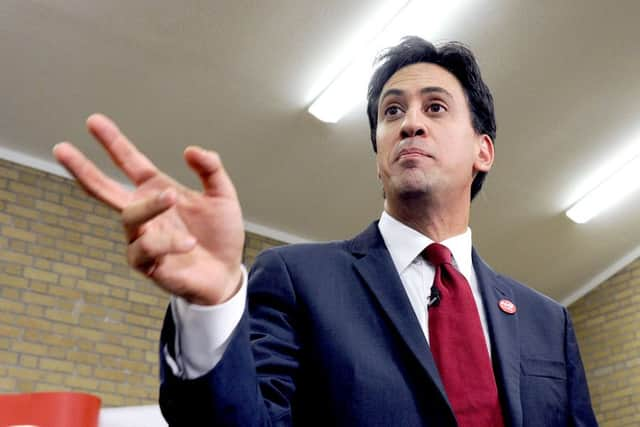Leaders: Ed Miliband needs to harden on SNP deal


According to the latest polling by Lord Ashcroft the continuing surge in support for the SNP could see Mr Murphy lose his seat. The leader of Scottish Labour is now nine points behind the SNP in his East Renfrewshire constituency, having been one ahead in February. The polling also shows more big Labour scalps are likely to go, including the embarrassing one of election campaign chief Douglas Alexander, and the Glasgow South West seat of Ian Davidson.
Yesterday saw the launch of the Scottish Labour manifesto, and there were few surprises. A pledge for more GPs and nurses and boosts for mental health and cancer in health incentives, and the now oft-heard pledges to cut zero hours contracts and increase the minimum wage. Nothing there that is going to reverse the fortunes of Labour in Scotland. Although Mr Murphy is looking like he might be out of a job, it is Mr Miliband who is looking like he might be out of government, as he can expect even fewer Labour MPs coming down from Scotland.
Advertisement
Hide AdAdvertisement
Hide AdYesterday David Cameron and George Osborne found the vital battleground of the economy further shifted to their advantage as Mr Cameron hailed record employment figures showing more than 31 million people in work and took the opportunity to warn that a Labour government propped up by the SNP would put that “jobs miracle” at risk. Mr Osborne seized on remarks by International Monetary Fund head Christine Lagarde praising the strength of the UK recovery compared with the rest of the European Union.
During the TV debate on Thursday night Mr Miliband went further in ruling out a pact with the SNP than he had before by saying that there were fundamental differences between the two parties and that he would never go in to coalition with a party that posed a threat to the Union.
But then yesterday he seemed to soften his stance and refused to rule out any deal. A so-called “confidence and supply” arrangement would see the SNP support Labour on individual issues as they came up, though obviously with something in it for the Nationalists.
Mr Miliband has probably not changed his position, but the last two days have thrown it into sharp relief. Although politicians want to keep their options open, and politics is all about doing deals, if he is going to maximise his chances of success Mr Miliband must act here. He has highlighted the difference in stances on the Union as the reason he will not go into coalition with the SNP, but he needs to go further than that. Surely his stance demands an undertaking now that there can be no deals at all with the SNP, which should concentrate Labour voters’ minds and shoot Cameron’s fox?
Ask not for whom the bill tolls
There is a logic to not saving up to pay for your funeral costs: why should you care, you’ll be dead. The same logic actually stretches if there is a pang of guilt over lumbering your relatives with the cost of a final farewell: why should you care how they feel…you’ll be dead.
But there are probably very few of us who take this extremely pragmatic view of our passing. Most will want to not leave any problems to those left. With that in mind, the figures we report today about increased borrowing for funeral costs provide sober reading. The International Longevity Centre UK predicts that average funeral costs could reach £7,000 by 2020, with the cost of a simple funeral projected to rise to £5,226. That is a significant sum for a family to face and many will have to borrow to meet it.
The think-tank estimates that hundreds of thousands of people in Britain are carrying debt from burying a family member.
Government support for those struggling to pay for funerals is complex and inadequate, the report finds.
Advertisement
Hide AdAdvertisement
Hide AdThere will always be cases where people die alone with families and there is no-one else to cover the cost but the state, and there will always be families that genuinely cannot meet the costs, and again these deserve state help.
But perhaps the most chilling line in the entire report was that one in four of us makes no provision for our funerals. Given there are many plans and policies available that can help, and that we are talking about an absolute inevitability here, it must be seen as selfish in the extreme not to have forethought and consideration for those you leave behind and get some money together.
FOLLOW US
SCOTSMAN TABLET AND MOBILE APPS